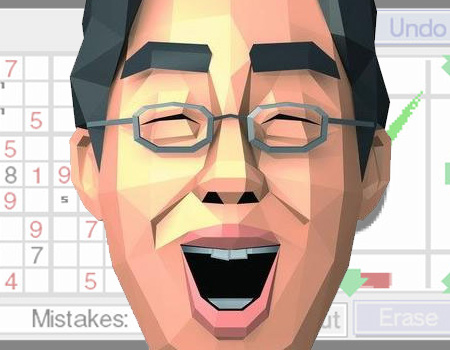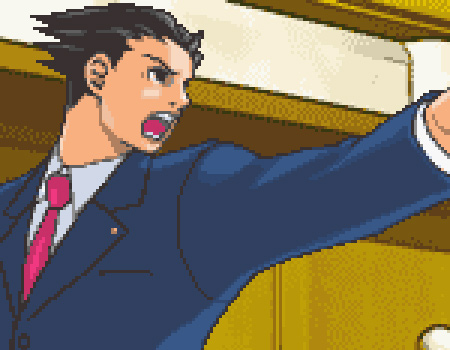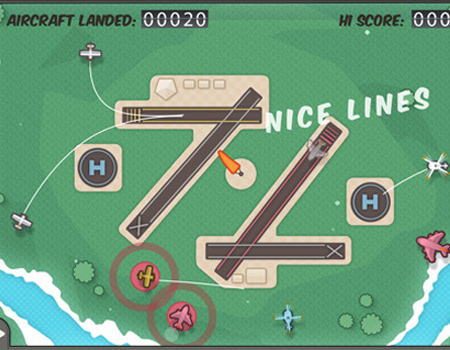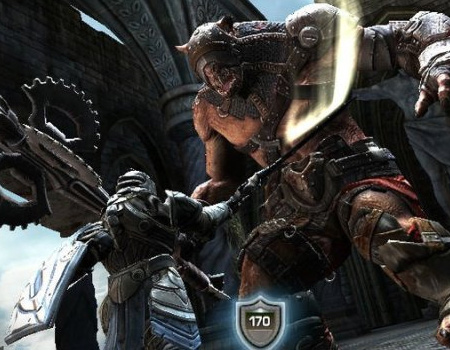Top 10 most important handheld games of the last 5 years
Game changers

Today, Pocket Gamer celebrates its fifth birthday. We’ve been on the web, doling out reviews, news, features, and interviews on any games console that fits in your pocket for the last five years. And boy has the handheld gaming landscape changed in that time.
Nintendo shocked fans with a 'gimmicky' dual-screen, stylus-controlled monster that defied all expectations by becoming one of the fastest-selling consoles of all times. Sony entered the handheld race with a do-all device, a console-like portable that was as powerful as it was bulky.
And mobile games went from brain-numbing time wasters to deep, graphically rich and weighty experiences. It all culminated in 2010 when the year’s most hyped game was about flinging multicoloured birds at houseproud pigs on your Apple doodad.
And even as we write this, the handheld world is changing. A new war, the tablet battle, is starting to heat up, Sony’s buddying up with Google to make Android games, Nintendo’s banking on stereoscopic 3D, and the NGP is on the distant horizon.
But what about the games? The adventures and experiences that have shaped the handheld landscape in these five long years? Well here are ten that planted their flag in the fertile soil and staked their claim as influential and important games, either with buckets of cash or a string of copycats.
Brain Training (2005)
As the 21st century dawned, gaming began to look farther afield than the stereotypical 'gamer dude.' From 2000, such watershed 'casual' games as The Sims and Bejeweled appeared, enticing new gamers young and old, and even a few of those 'girls' I’ve read about.
The casual revolution was among us, and it hit the handheld space with aplomb in Nintendo’s faintly-educational brain-buster Dr Kawashima's Brain Training.
Its fishy pseudo-science might not have been able to actually date your brain, and there’s no scientific proof that an hour of sudoku will make you a better student, but it definitely did one thing right.
It made mums and grandads take notice, and realise that games weren’t just about shooting imps and jumping on turtles. They could use it for cerebral-workouts and to push back nasty mental decline. It sold a bundle, and there are still clones and emulations of the formula to the day. And Kawashima? He’s now on Kinect, mixing mental workouts with silly limb-waggling.
Skipping Stone (2005)
Skipping Stone proved that mobile games didn’t need complicated controls, in-depth combo systems or armfuls of features to delight. In fact, it enthralled, addicted and enraptured millions with just one button. And with no goal other than to beat your best time, it could be considered the birth of the endless genre.
Games like Flight Control, Canabalt, and Robot Unicorn Attack have pride of place on our mobile home screens because they are so ruthlessly addictive, and because there’s nothing to complete or finish.
With eternal levels and nothing but a high score leaderboard for company, there’s nothing to stop you playing these games until the sun explodes in a fiery supernova.
And Skipping Stone was at the start, and one of the first must-have games for any mobile connoisseur. It was the first phone title since Nokia’s Snake that was responsible for missed bus stops, lapsed concentration, and ignored phone calls the world over.
Phoenix Wright (2005)
Something about the DS made it more appealing to new genres and fresh experiences. The Game Boy Advance saw plenty of Japanese-only games that never made it over the pond, including weird and wonderful treats like fierce puzzler Guru Logic Champ, wacky RPG Mother 3 and tap-along Rhythm Tengoku.
But then the DS came along, and suddenly anything went. Games about bomb-defusing doctors, teams of dancing blokes, and puzzle solving gents fit the new console’s widened remit. Maybe it was the more approachable interface or the console’s wider audience, but now studios were willing to try something wacky.
The best of the bunch is undoubtedly finger-pointing law sim Phoenix Wright, a theatrical courtroom text adventure with double-crossing characters, bonafide spirit mediums, more twists and turns than a Curly Wurly, and an irresistible backing soundtrack. It made the DS stand out, and it’s still one of the best franchises on the old machine.
Reset Generation (2008)
Yes, the N-Gage might have been a dud. The side-talking taco-shaped goofball with its game cartridges hidden underneath the phone’s battery, and then a forward-looking platform that never really got off the ground. But one game stood out, and made N-Gage hard to ignore.
The game was Reset Generation, a puzzle-strategy hybrid, with a multiplayer mode that was cross-compatible with a PC version. And it came from Finnish game studio RedLynx, which has since gone on to win more than a million fans with addictive XBLA stunt-biker Trials HD. It was also as charming as it was fun to play, with loads of snarky references to gaming culture.
But what made it important was its social functions. It tied in to your Nokia player page to show off achievements and high scores to pals to the two friends who actually bought the N-Gage.
But it encapsulated a lot of the Game Center and OpenFeint functionality that we call 'social gaming' today, long before the iPhone had such features. Pity no one played it.
Rolando (2008)
Rolando was the first game that made us sit up and take notice of the iPhone as a gaming platform. Just a few months after the device’s App Store opened for business, here was an alarmingly cute and eminently playable bundle of fun from London developer HandCircus.
Suddenly, with one game, the smartphone blossomed as a potential gaming platform. It was right then that the iPhone’s dominance was written in the stone, and developers, publishers, and gamers took note. And while we might baulk at the £6 price tag today, it was ludicrously cheap when compared to DS and PSP alternatives.
Eliminate (2009)
ngmoco’s Rolando might have been big, but it left the firm with a big problem: piracy. Digital buccaneers were ripping off the company’s games, leaving profit margins razor-thin. It needed a new way to make money, and to do so the company looked east.
In Asia, where piracy is rampant, publishers had turned to an ambitious concept called Free 2 Play, or as we know it today, freemium. You give the game away for nothing and then nickle and dime addicted players on virtual hats and ethereal doodads for their lives. It’s made some companies very rich.
And with in-app purchases, it’s become a huge source of wealth on the iPhone. Today, many of the App Store’s top grossing games are free, as titles like Tap Zoo, Smurfs’ Village, Farmville, and iMobsters made big bucks on additional content. We’ll give ngmoco's Eliminate the nod for popularising it, though.
Flight Control (2009)
Flight Control might just be the perfect mobile game. It’s simple to play, endlessly enjoyable, disarmingly addictive, and comes in at a pocket money 59p. It has been an enduring sight on the App Store sales charts, and our iPhone home screens, with an almost perfected formula of on-the-go fun.
It also did amazingly well for Aussie developer Firemint, and the company has since ported the game to loads of devices including PlayStation 3, Android, and DSiWare.
But Flight Control’s simple premise, rock-bottom price tag, and huge sales spurred on many a developer. Today’s top games like Cut the Rope and Tiny Wings definitely have Flight Control to thank in a small way.
Grand Theft Auto: Chinatown Wars (2009).jpg)
When Chinatown Wars came out, it was arguably the day DS grew up. It’s voice dropped several octaves, it had hair in odd places, and had a weird reaction when seeing a pink DSi across the room. Rockstar brought blood, gore and grown-up stuff to the innocent Nintendogs-friendly console.
The best bit was the addictive meta game, which had you bouncing around the corners of Liberty City buying and selling made-up drugs as the market wildly fluctuated, all while hoping that the cops didn’t catch you peddling, or they’d confiscate your expensive stash.
Despite controversy, it didn’t do very well for the console. The game only managed a miserable 90,000 sales in its first few weeks. But it gave the developer a game it could port to new consoles, and it ended up on PSP, iPhone, and iPad, consistently delivering high quality gameplay.
Infinity Blade (2010)
We struggled with this one. We wanted to include a game that truly encapsulated the way mobile game makers have started to take the space incredibly seriously with massive teams, bumper budgets and proper, console-like experiences.
In the end, Chair’s Infinity Blade just beat out Firemint’s $2 million, jaw-dropping racing sim, Real Racing 2.
Like John Carmack’s Rage, Infinity Blade takes a console-quality engine and squeezes it onto the iPhone. It shows just how flexible Unreal Engine 3 is, how immensely powerful the iPhone is, and how serious these studios are taking the App Store.
And, for Chair at least, it’s paid off. The game raked in a record-breaking 200,000 sales in a matter of days and since went on to outsell the developer’s Xbox Live Arcade game Shadow Complex. And it still costs less than a Burger King.
Angry Birds (2010)
Did you think we were going to miss out Angry Birds? The whirlwind cultural phenomenon that’s been downloaded more than 50 million times in just one year of release. The game that’s pushed sixty thousand soft toys and persuaded 40 per cent of players to double the game’s purchase price by buying the optional Mighty Eagle content.
The game that’s seen 14 updates, four spin-off holiday versions, an impending movie tie-in, and 291 added levels since its first release just over a year ago. The app that counts footy legend Paul Gascoigne, prime minister David Cameron, TV host Conan O’Brien, and canuckian pop zygote Justin Bieber amongst its fans.
No, we didn’t miss out Angry Birds.
